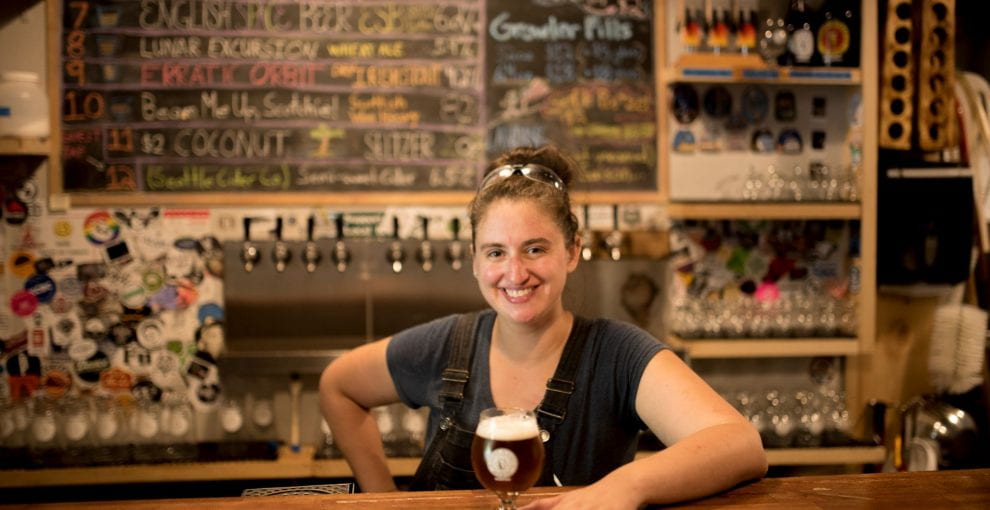[Meet the Instructors is a series intended to introduce you to one of the greatest resources the University of Washington Tacoma Professional Development Center has to offer: its diverse team of veteran, industry-tested professionals. The Center’s professional development programs are designed to be rewarding, challenging and cutting-edge. Our instructors play no small part in that, ensuring students are exposed to the most current industry trends while remaining well-versed in the tried-and-true best practices of their professions. We’re excited to share our instructors with you, and their stories are a great place to start.]
You’ve been a homebrewer and now a professional brewer – tell us about that journey. How did you decide to brew professionally?
My journey from homebrew to professional brewing happened surprisingly organically. I started homebrewing over well over a decade ago while in college, and the hobby grew from there. While living in Bristol, England, I became more and more fascinated with sensory analysis and began to be more involved in stewarding and judging homebrew competitions. Eventually, I was able to earn my BJCP judging certifications. By 2015, I had become more ensconced in the beer industry, and when a friend of mine, Richard Poole, was hired on as the Head Brewer for a brewery called Left Handed Giant, he asked if I’d like to help out. The choice seemed obvious, and I have not looked back since!
What is the biggest difference between brewing for fun and as a professional?
Of course the first thing that strikes every homebrewer who enters a brewery is the scale, the sheer size of everything, plus the complex equipment. I have a distinct recollection of my first day in a professional brewery, being told to weigh out 24kg of hops and being blown away at the sheer quantity! However, I would argue that the real difference is the stakes are much, much higher. In homebrewing, if you mess up some aspect of a batch, it’s certainly not fun, and is of course disappointing, but your livelihood is not on the line. In comparison, for nano and microbreweries, a ruined batch can mean the difference between a given brewery’s success or failure. As such, all good brewers develop a keen attention to detail, ensuring that you are creating the best product possible.
Are there any “homebrewer tricks” that you apply to your work now?
I don’t know that I would call it a “trick” per se, but I believe I’ve taken the “MacGyver” spirit that so many homebrewers have, and translated that to my professional life – I am more prone to creative problem solving (that may or may not work). I think this is one of the biggest differences between those who have spent time homebrewing and those who have not. When the wrong fitting was ordered or some other minor issue crops up, a creative solution can always be found!
Oppositely, what is some pro-brewing knowledge you think a good home brewer could take advantage of?
I think many homebrewers ignore their water. More and more research is constantly coming to the fore that demonstrates how essential our water treatment is! I know many homebrewers are starting to catch on to this, and are doing their own research and making huge improvements, but it’s still too widely ignored. We’re very lucky that in the Seattle area, we have some great water that’s essentially the closest to a blank slate that you can get. Unfortunately, in order to make styles from around the world, the first step is to attempt to emulate the naturally occurring water in those regions. If you’ve ever wondered why your stout isn’t quite smooth enough, or your pilsner has a harsh finish, it’s likely due to water chemistry.
You work at two breweries – both Outer Planet and Lowercase Brewing? What’s that like?
It’s fantastic! I get to have the best of both worlds – I love the creative freedom I’m allotted at OPB, and the real sense of control I have in the product. However, as OPB is a smaller brewery, we don’t have the resources to make certain styles (lagers in particular) or to use certain equipment. I have the unique opportunity to learn from John Marti at Lowercase, working to perfect lager techniques, as well as learning to use higher end lab equipment and larger, more complex equipment.
What is your favorite type of beer to brew? To drink?
My favorite beers have always been Belgians! My first real love affair with beer was tasting Belgian ales in college, though I will admit that my taste has developed drastically since then. Having trained in the U.K., I also have quite a soft spot for British Ales – give me a good Wee Heavy or a proper stout and I’ll be happy.
I love brewing Belgian Witbiers. I have done quite a bit of experimentation, and have found it to be a surprisingly versatile style. The flavors that the yeast emits pair amazingly with so many flavors, not just the traditional coriander and orange peel. I wish they were more popular in the area so I could brew more of them!
You’re now adding teaching about beer to your career – what makes you want to do that?
I have actually been teaching off flavor classes at Sound Homebrew Supply in Georgetown for about a year now. I find that I thoroughly enjoy helping students really learn to pick apart a beer and the flavors they taste. I love seeing a student realize that they can indeed recognize and diagnose problems, they just need a little help to recognize the flavors.
Have you ever had any brewing education yourself? If not, how did you learn your trade?
Generally speaking, I am self-taught. I started homebrewing as a hobby, not imagining it would amount to more than a fun way to pass the time and a cheaper way to drink beer. The more I learned, the more I realized I knew pretty much nothing. I read voraciously and conducted my own experiments with hops and water treatments.
It was eventually suggested to me that I just go ahead and take the judging certification exam, which I studied for quite intensely. This involved a huge amount of reading, as well as tasting beers from around the world (whether I had interest in them or not – I recall a few days in particular spent tasting American Light Lagers, which was certainly not an interest of mine at the time!)
Why should a student interested in beer or a career in craft brewing take a course like Mastering Beer Styles?
First of all, learning the basics of the industry is incredibly important – I often wish I had been able to take a class like this before I entered the professional industry. I also I feel strongly that part of truly understanding beer is to spend time with many different beers from varying places. As I mentioned earlier, in preparation for my exams I spent quite a bit of time tasting beers that I might not have thought about twice, but spending that time thinking critically about them gave me new insights into the product.
Perhaps even more important is understanding your own palette. I cannot emphasize enough that every person’s palette is totally unique. What I might perceive in some beers, you may experience totally differently! It is essential to understand this, and to understand how your taste receptors process flavors and mouthfeel. I think this is probably one of the most fundamental aspects of brewing that is frequently overlooked.
Why is it important to have a handle on beer styles?
There are so many reasons! First of all, if you know what styles should taste like, you can work towards accurately recreating them. Think about it this way: if you were a chef, would you attempt to create a complex mole sauce or a bouillabaisse without knowing what it should taste like? Second, once you have an understanding of how a style should taste and is traditionally brewed, you can begin to put your own spin on it and truly flex your creative muscles! And third, having a handle on these styles allows you to be part of a greater conversation – you can contribute to industry conversations on how styles are shifting or changing. Pale ale and the IPA are perfect examples right now: the definition of both of these is beginning to shift in the public eye (in my opinion), and if you don’t understand what the fundamental definition of the beer is, then you cannot begin to understand how it has changed.
What most excites you about this new endeavor?
Introducing students to exciting new styles that they never knew existed! As well as helping students understand their own palettes – seeing a student realize that they taste something differently than everyone else and finally understanding how that plays into their craft is immensely satisfying. I’m hoping I can truly help some people to get to know their taste buds on a deeper level.
What excites you about the craft beer industry today? In Seattle, in Washington and in general?
I find the creativity and willingness to take risks is one of the best parts of the beer industry today. Ten years ago, you would never have seen tiny nanobreweries creating ancient styles using insane ingredients and not only seeing mild success, but have their bottles widely sought after. I love witnessing the incredible amount of innovation that goes in to some of these beers! I think this is something that Seattle, and Washington in general, excel at. I suspect a beer brewed using 700F pillow basalt would not have gone over quite as well a decade ago (a beer Lowercase made early last year)!
I also think that the push for more local and more sustainable ingredients and techniques is very exciting. I love seeing breweries pair with sustainable hop farms and maltsters, working to lower than carbon footprint by using more energy efficient equipment, changing up water procedures and moving away from gas-fired systems.
What do you hope your students take away from Mastering Beer Styles?
If nothing else, I hope they take away a greater appreciation for styles that they might not have put much stock into previously. I would love to see students really pick apart styles they hadn’t thought about before, and see that every region has evolved wildly different styles of beer.
I also hope they come away from the class with more of an understanding of their own personal palette. Every person tastes differently, and learning how your palette differs from someone else’s and how you perceive certain flavors if one of the best tools you can have in your arsenal.

